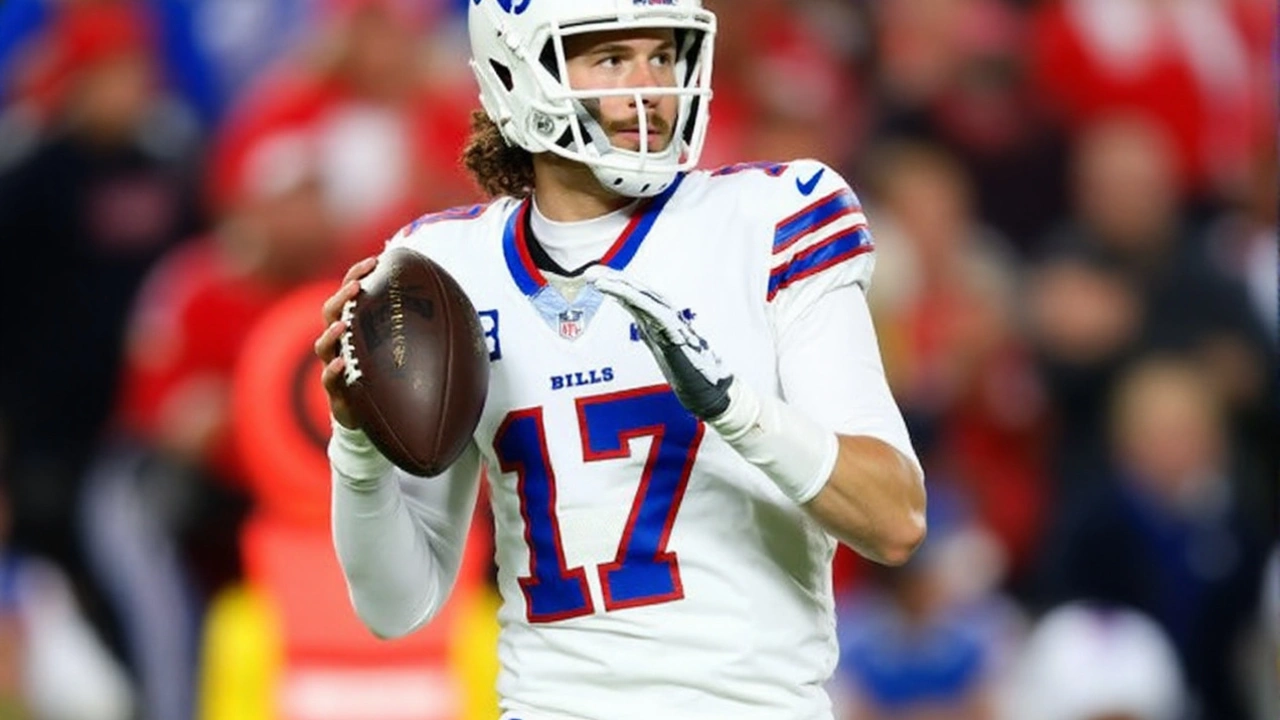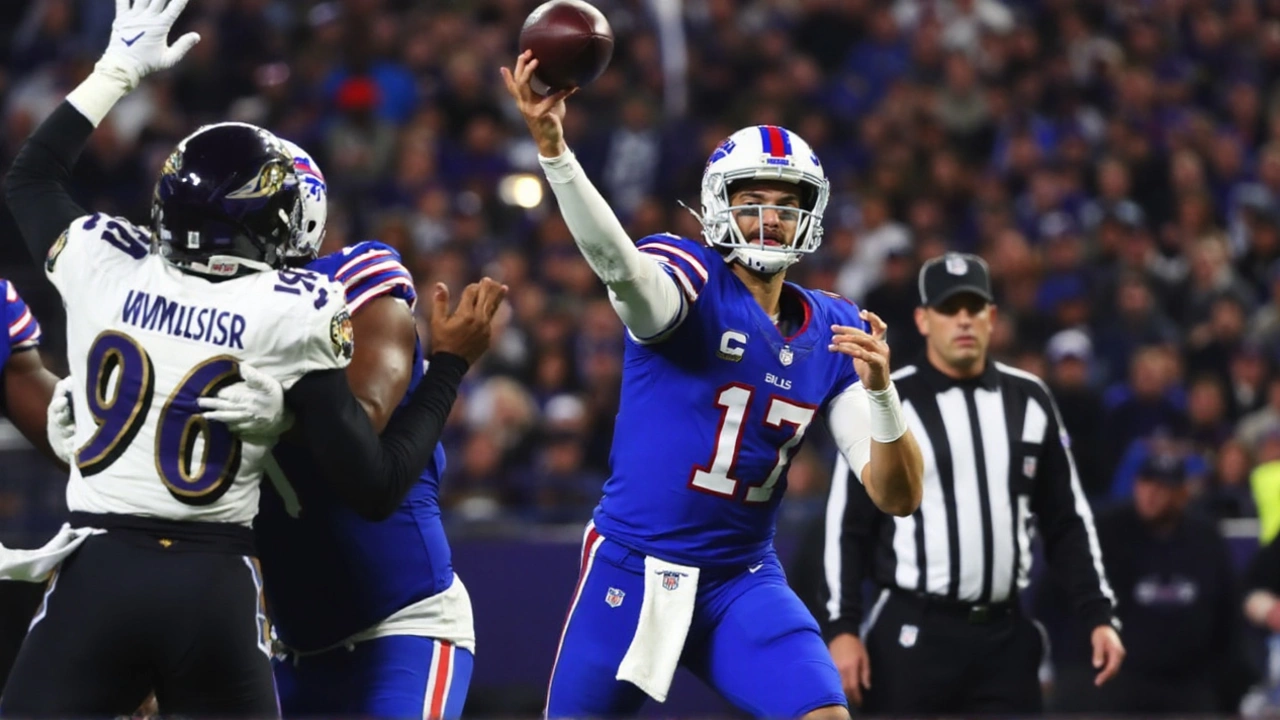A four-minute finish that flipped an opener on its head
Highmark Stadium’s final season got the kind of sendoff opener that borders on folklore. The Buffalo Bills, down 40-25 with just over four minutes to go, strung together 16 unanswered points and stole a 41-40 win over the Baltimore Ravens on Sunday night. It was the kind of swing you feel in your chest before you believe with your eyes.
Josh Allen, the reigning MVP, was the spark and the battery. He carved up Baltimore late, piling 251 passing yards and accounting for three touchdowns in the fourth quarter alone while posting a 131.3 passer rating in that frame. The numbers look made up until you remember the throws: lasers to the sideline, deep overs into tight windows, and a scramble drill that turned chaos into points.
Baltimore had controlled most of the night. Lamar Jackson steered the offense with poise. Derrick Henry mauled through arm tackles, hammering out 169 rushing yards and two scores, including a 49-yard burst that showed he still has the one-cut, full-stride menace to erase angles. The Ravens wore down Buffalo’s front for three quarters and looked set to ride out the clock.
Then one defensive snap blew the door open. Ed Oliver knifed in and tomahawked the ball out of Henry’s grip—Baltimore’s power back had been brilliant all game, and that made the swing feel even bigger. That takeaway set the stage for the first of two late Bills touchdowns and—more important—the belief on the home sideline that this was not over.
Allen’s most audacious moment came on a play that started badly and ended in a rookie’s gut. He rifled a throw that tipped off hands in traffic, and Keon Coleman, making his first start in a season opener, stuck with it and hauled it in as bodies crashed around him. It was a rookie’s first real “welcome to the league” snapshot—hands, focus, and zero panic.
The ending belonged to a newcomer with a plane ticket still warm. Matt Prater, signed three days earlier after Tyler Bass went down injured, jogged on like he had been in Orchard Park for a decade and drilled a 32-yard field goal at the horn. No drama in the swing, no wobble off the foot. Ball up, ball through, teammates sprinting at him. From unemployed on Wednesday to the hero of Sunday night.
“Our team didn’t quit,” Allen told NBC’s Melissa Stark on the field, smiling as fans roared. “I think there’s people who left the stadium. That’s OK. We’ll be fine. But have some faith next time.” Joey Bosa, making his Bills debut, tried to explain what it felt like. “I’m like, in a dream right now,” he said. “That was unbelievable. I don’t know if I’ve ever been this happy after a win.”
This was billed as a heavyweight opener and lived up to the poster: the last two MVPs sharing the stage, a Baltimore offense rebuilt to bully on the ground, and a Buffalo team that believes there’s no such thing as “too late” with No. 17 in the huddle. According to the Elias Sports Bureau, it was the first season-opening meeting between the top two MVP vote-getters from the previous season since at least 1970, and just the fifth opener since 1970 featuring MVPs from the prior two years.
- The strip: Oliver’s forced fumble on Henry flipped the math and the mood, turning a run-out-the-clock scenario into a live-wire finish.
- The tip drill: Coleman’s contested touchdown catch on a deflected ball kept Buffalo close and put Baltimore on its heels.
- The kick: Prater’s 32-yarder at the buzzer capped 16 straight Bills points in the final 4:05 and sent the sideline into a pile.
Before the collapse, the Ravens had the plan you draw up on a whiteboard. Jackson probed the edges. Henry punished light boxes, especially early downs. Baltimore’s line created double teams and movement, and Jackson made sound decisions against Buffalo’s blitz looks. When the Ravens needed to scoot the chains, they went heavy and did not apologize for it.
But late-game football compresses everything—field, time, and nerves. Baltimore’s offense over those final minutes stalled, then blinked. Buffalo’s defensive front, quiet for long stretches, surged. Oliver won his gap. Bosa impacted protection. Linebackers triggered downhill instead of playing catch-up. The Ravens had chances to end it. They didn’t.
For Buffalo, this opener also hummed with something bigger: a farewell tour for their home of nearly half a century. The new stadium rising across the road will debut next year; this fall is the last lap for the current Highmark. Fans will argue about greatest moments for years. Sunday night’s thunderbolt earned a spot on the short list by halftime of Week 1.
There’s also recent history between these sides. Buffalo knocked Baltimore out in last season’s divisional round, 27-25, another tight one that hinted at parity and decided edges. Both teams entered 2025 with the shortest odds to win the AFC (+325). Nothing about Sunday changed the idea that these are January teams. What changed is the memory bank: if they see each other again, everyone will remember how fast a lead can disappear.
Allen’s fourth quarter was the difference, but the Bills needed complementary football to get there. Joe Brady kept tempo when Baltimore tried to bleed snaps, mixing quick throws with motion to stress matchups. The line gave Allen just enough time on must-have downs. Wideouts won at the catch point. And after the Oliver takeaway, Buffalo avoided the kind of penalty or sack that kills fast comebacks.
The Ravens won a lot of snaps. Their secondary closed windows for most of the night, and Henry’s rhythm runs set Baltimore up for manageable third downs. Jackson looked in control, accelerating outside the pocket when edges collapsed and finding throws off boot action. The late letdown does not erase three-plus quarters of well-crafted offense. But it will sting—and the flight home will replay the sequence: protect the ball, finish a drive, force Buffalo to burn clock. They did none of it when it mattered most.
From a personnel angle, Buffalo’s new faces popped. Bosa’s first Bills game ended with a grin and a win. Coleman provided the high-wire play rookies dream about. And Prater’s calm is why teams carry a list of veteran specialists who can be on a plane by dinner. It’s not just leg strength. It’s routine under pressure. He looked like he’d been kicking in Orchard Park winds for years.
On the other sideline, Henry in purple looked like Henry in his prime—downhill, patient, and punishing. The Ravens signed him to tilt games and shorten them. For most of the night, that was exactly how it played. The fumble, though, will be the frame that gets replayed. Ball security is the one non-negotiable in a four-minute offense. A single punch undid 169 hard-earned yards.
There was no hidden controversy, just swing moments and execution. Buffalo won on third downs late. Baltimore failed to stack first downs when the clock demanded it. Special teams were the tiebreaker. A team that signed a kicker midweek won because that kicker didn’t feel midweek at all.
In the bigger AFC picture, both teams leave Week 1 looking like what the preseason said they were. Buffalo is explosive and resilient, capable of bending a game’s shape in a handful of snaps. Baltimore is physical, efficient, and built to travel—even if Sunday ends with the kind of sour taste that has become too familiar in tight meetings with these Bills. You don’t rewrite a season in one night. But you do learn something about who blinks, who swings, and who finishes.
Allen got the last word on the field. McDermott’s defense got the stop they had to have. Brady’s offense zipped when it had to sprint. And Prater, the new guy, got hoisted in the air like he’d been part of the locker room forever. For a franchise starting its final chapter in a beloved home, that felt just right.

What the comeback says about both teams
For Buffalo, the lesson is simple: the ceiling is still sky-high because quarterback play and pass rush travel. Ed Oliver’s punch-out will sit on the highlight reel, but it’s also a reminder of how far he’s come—from disruptive flashes to clutch production. Add Bosa on the edge and a rookie wideout who plays through contact, and this roster looks deeper in the right places.
The Bills also showed game-management clarity. They played fast without getting sloppy, avoided burn-the-clock penalties, and trusted a veteran kicker new to the building. That’s coaching alignment as much as talent. The emotional charge of a stadium’s last opener can blow a team off script. Buffalo used it to keep the gas down when the situation begged for it.
For Baltimore, there’s no identity crisis here. Henry’s fit is real. The line moved people. Jackson operated with command. But finishing is a habit, and habits are built in these exact spots. The Ravens will spend the week hammering four-minute situational work—ball security, first-down efficiency, and field position choices that tilt the final possession. John Harbaugh has won too many tight games to let this one become a blueprint against them.
These teams have January written all over them. If there’s a rematch, it will come with the memory of a September night when a game flipped in four minutes. And everyone on both sidelines will feel it—how loud a stadium can get, how fast momentum moves, and how thin the margin is when two contenders trade haymakers under lights.
